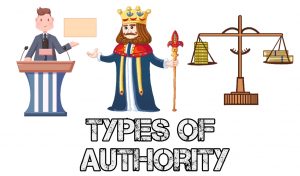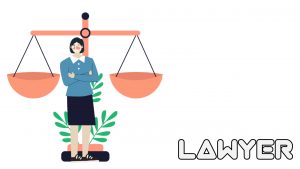Types Of Authority in Government: The official right to execute the task is known as authority. “The right to make instructions and the ability to enforce obedience,” Henry Fayol defined authority. The ability to impose adherence is granted to management through authority. It is the ability to issue commands and ensure that they are followed.”
Authority is defined as “the ability to make judgments that direct another’s behaviour.” It is a partnership between two people: one supervisor and one subordinate. The superior frames and conveys choices in the hopes that the subordinate would accept them. Such judgments are expected of the subordinate, and they shape his behaviour.”
Any country or government, any state or other political subdivision thereof, and any organization performing executive, legislative, judicial, regulatory, or administrative duties of or related to the government are referred to as “government authority.”
Some management writers claim that the notions of power and authority are interchangeable, while others argue that they are separate. People have many diverse perspectives on both. One form of power is authority. It is founded on the acceptance of the validity or legality of the effort at persuasion. However, power is defined as “the capacity to exert influence, that is, the ability to affect individual or group attitudes or behaviour.”

Recommended: Ways of promoting national unity
A 1959 research by French and Raven identified five bases or sources of power that an individual possesses over others. They are;
1. Legitimate Power: It usually stems from a person’s position and is derived from our cultural system of rights, obligations, and duties, in which people recognize a “position” as “legitimate. In governance, this power is derived primarily from the representative government institution.
2. Coercive power: This stems from a person’s capacity to instil fear in another person, and it is based on the subordinate’s anticipation of punishment if he or she does not agree with or follow the superior’s instructions or views.
Also see: Meaning and Characteristics of human rights
3. Reward power: This is predicated on the subordinate’s expectation of punishment if he or she does not agree with or obey the superior’s orders or ideas, and it originates from a person’s ability to induce fear in another person.
4. Expert power: This is the power of specific knowledge, ability, and competence. Because the superiors have this information, the subordinates want to carry out the wishes and directives of their superiors. Physicians, attorneys, and university teachers may wield significant power over others due to their specialized expertise.
5. Referent power: The identification of individual faith as a leader who is held in great regard, revered, and often emulated by the subordinate is the basis of referent power.
Recommended: Causes, Effects and Solutions to Conflict in Africa
Characteristics of Authority
1. Basis of Getting Things Done: Authority is the framework for achieving the desired objectives done in the organization. It means the power to influence the behaviour of people in the organization to complete defined tasks to meet intended goals.
2. Legitimacy: Authority is recognized because it carries a certain amount of validity, implying the right to demand action from others. This privilege might be statutory or formal, or it could be based on custom. Authenticity criteria that are customary or widely recognized. A manager’s power to influence his employees’ behaviour is granted to him by his position or office in the organization.
Recommended: Advantages and Disadvantages of a written constitution
3. Making decisions is a requirement of authority: Only after he has made decisions on the course of operations to be undertaken by his employees may the boss compel them to behave or refrain from behaving in a certain way.
4. Subjectivity in Implementation: While authority seems to have an aspect of objectivity to it, its exercise is heavily influenced by subjective measures such as the temperament of the leader who has the authority to use it, as well as the personal qualities of the subordinate or group of followers with whom it is to be exerted.
Also see: Differences between a presidential and parliamentary system of government
Types of Government Authority
1. Legal Authority: The authority depends on the person’s position within the organization, and it can be granted by law or by social norms, rules, and regulations that are protected by law. A location officer, for example, can arrest someone who has committed a crime under the law. Similarly, a company’s president has the authority to terminate an employee since that is how the company’s rules and regulations were formed. This sort of authority is comparable to power, which is defined as the ability to maintain control over one’s aims and beliefs.

This authority is also known as formal authority and has been legalized through social institutes that use a maze of laws, rules, cultures, and ethics to achieve and enforce collective goals, aims, and welfare. This sort of power is ingrained in the bureaucracy, where it is delegated to contractually employed and appointed officials.
Although bureaucracy is the truest form of legal authority, others include rotating officeholders, elected officials, and officeholders selected by lot. They have comparable authority because they are bound by the same set of rules and regulations that regulate their positions and determine their authority limitations.
Elected officials, such as a country’s president, a member of parliament, or a community leader, are examples.
Recommended: How to know a person who has low intelligence
2. Traditional Authority: This authority is founded on a belief in traditions as well as the legitimacy of individuals who exercise authority via those traditions. In the shape of the governing “Lord” and the obedient “subjects,” such traditions arose from the social order and community ties.

The promise of traditional “piety” and traditional reverence and identity of the “Lord” or the King or the tribal chief lead to loyalty. The traditional chief is typically free to establish his own rules and choices.
Traditional power goes from the top down, from the owners or investors to the board of directors, the president, vice presidents, middle management, supervisors, and workers. with the referent, expert, coercive, and reward power all affecting formal authority acceptance.
The sources of power or influence do not limit the use of authority; rather, they impact how it is used and accepted.
Acceptance Theory of Authority
The conventional formal understanding of authority is contrasted with the acceptance theory of authority. Ultimately, according to the accepted theory, authority is based on the approval or permission of those who are managed (subordinates), not on legitimacy or any legal, social, or cultural standards.
If the subordinates refuse to obey their superior’s orders, the superior cannot be considered to have any control over them.
In 1938, Chester Barnad began writing on organizations as “cooperative systems,” proposing the “acceptance theory” or “bottom-up theory of authority.” He claimed that management only has as much authority or influence as its subordinates are prepared to accept and as long as they agree to follow orders.
For subordinates to cooperate with authoritative communication, Barnard argued that at least four requirements must be satisfied.
The communication has been completely comprehended.
The employee feels the instruction is in line with the organization’s goals at the time of decision.
Employees feel the directive is compatible with their interests and objectives at the moment of choice.
Employees think he or she is physically and intellectually capable of following instructions.
Recommended: Advantages and Disadvantages of Shopping online
3. Charismatic Authority: The Charismatic Authority is based on a leader’s charisma, which is defined as a leader’s ability to demand respect from his followers based on his personality and personal characteristics such as intellect and honesty. Religious and political leaders are particularly guilty of this. Because the leader’s aims appear to be in line with their own, the followers develop a strong attachment to him.

A charismatic leader is a powerful orator who hypnotizes his people into accepting his command and authority. For example, President John F. Kennedy of the United States was recognized for his charisma and ability to captivate audiences, and many subsequent presidential candidates attempted to emulate his approach. Some organizational executives have a reputation for being charismatic and responsible for their organizations’ success.
Competency Theory of Authority
This is often referred to as “technical authority,” and it is based on a person’s specific knowledge or expertise. You accept a doctor’s “order” to rest, for example, since you appreciate his expertise and abilities as a physician. This order will not work unless you accept and obey it, thus it is based on the acceptance theory of authority.

Edeh Samuel Chukwuemeka, ACMC, is a lawyer and a certified mediator/conciliator in Nigeria. He is also a developer with knowledge in various programming languages. Samuel is determined to leverage his skills in technology, SEO, and legal practice to revolutionize the legal profession worldwide by creating web and mobile applications that simplify legal research. Sam is also passionate about educating and providing valuable information to people.